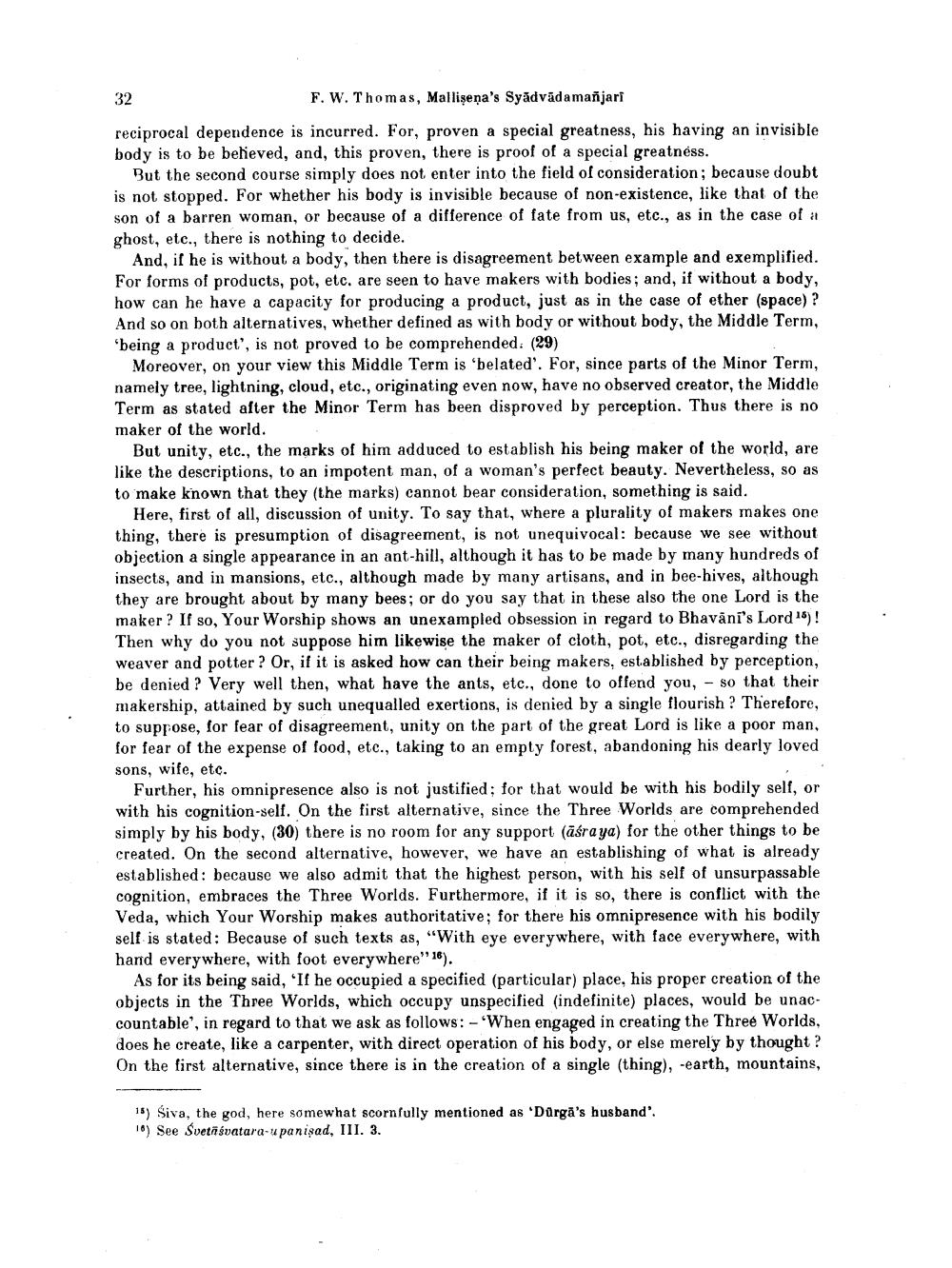________________
32
F. W. Thomas, Mallişena's Syādvādamanjari
reciprocal dependence is incurred. For, proven a special greatness, his having an invisible body is to be believed, and, this proven, there is proof of a special greatness.
But the second course simply does not enter into the field of consideration, because doubt is not stopped. For whether his body is invisible because of non-existence, like that of the son of a barren woman, or because of a difference of fate from us, etc., as in the case of a ghost, etc., there is nothing to decide.
And, if he is without a body, then there is disagreement between example and exemplified. For forms of products, pot, etc. are seen to have makers with bodies; and, if without a body, how can he have a capacity for producing a product, just as in the case of ether (space)? And so on both alternatives, whether defined as with body or without body, the Middle Term, 'being a product', is not proved to be comprehended. (29)
Moreover, on your view this Middle Term is 'belated'. For, since parts of the Minor Term, namely tree, lightning, cloud, etc., originating even now, have no observed creator, the Middle Term as stated after the Minor Term has been disproved by perception. Thus there is no maker of the world.
But unity, etc., the marks of him adduced to establish his being maker of the world, are like the descriptions, to an impotent man, of a woman's perfect beauty. Nevertheless, so as to make known that they (the marks) cannot bear consideration, something is said.
Here, first of all, discussion of unity. To say that, where a plurality of makers makes one thing, there is presumption of disagreement, is not unequivocal: because we see without objection a single appearance in an ant-hill, although it has to be made by many hundreds of insects, and in mansions, etc., although made by many artisans, and in bee-hives, although they are brought about by many bees; or do you say that in these also the one Lord is the maker? If so, Your Worship shows an unexampled obsession in regard to Bhavani's Lord 15)! Then why do you not suppose him likewise the maker of cloth, pot, etc., disregarding the weaver and potter? Or, if it is asked how can their being makers, established by perception, be denied ? Very well then, what have the ants, etc., done to offend you, - so that their makership, attained by such unequalled exertions, is denied by a single flourish? Therefore, to suppose, for fear of disagreement, unity on the part of the great Lord is like a poor man. for fear of the expense of food, etc., taking to an empty forest, abandoning his dearly loved sons, wife, etc.
Further, his omnipresence also is not justified: for that would be with his bodily self, or with his cognition-sell. On the first alternative, since the Three Worlds are comprehended simply by his body, (30) there is no room for any support (āśraya) for the other things to be created. On the second alternative, however, we have an establishing of what is already established: because we also admit that the highest person, with his self of unsurpassable cognition, embraces the Three Worlds. Furthermore, if it is so, there is conflict with the Veda, which Your Worship makes authoritative; for there his omnipresence with his bodily self is stated: Because of such texts as, "With eye everywhere, with face everywhere, with hand everywhere, with foot everywhere"16).
As for its being said, 'If he occupied a specified (particular) place, his proper creation of the objects in the Three Worlds, which occupy unspecified (indefinite) places, would be unaccountable, in regard to that we ask as follows: - 'When engaged in creating the Three Worlds, does he create, like a carpenter, with direct operation of his body, or else merely by thought ? On the first alternative, since there is in the creation of a single (thing), -earth, mountains,
15) Siva, the god, here somewhat scornfully mentioned as 'Durgā's husband'. 16) See Svetisvatara-upanişad, III. 3.




